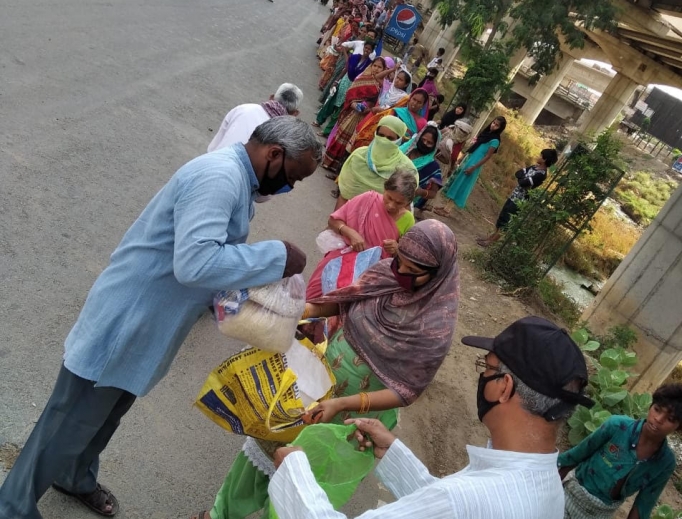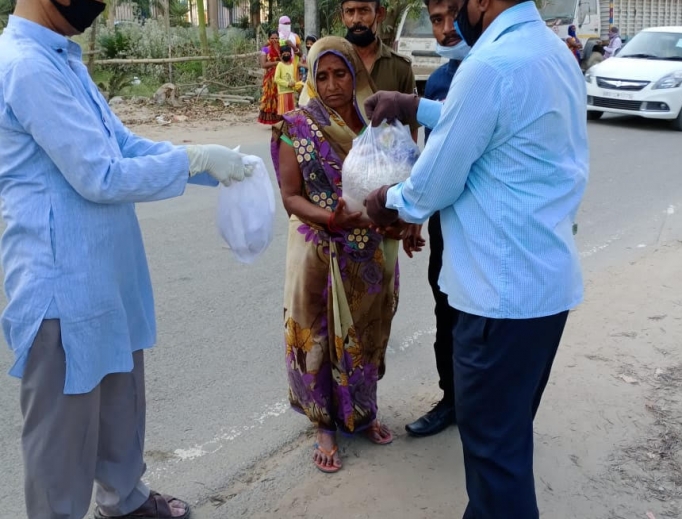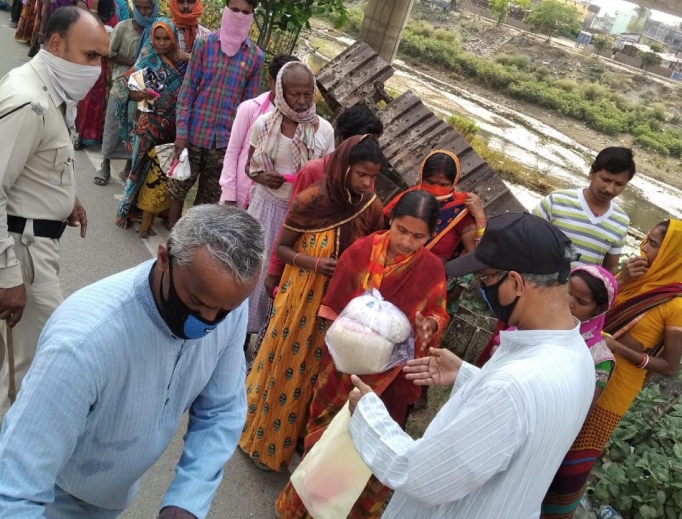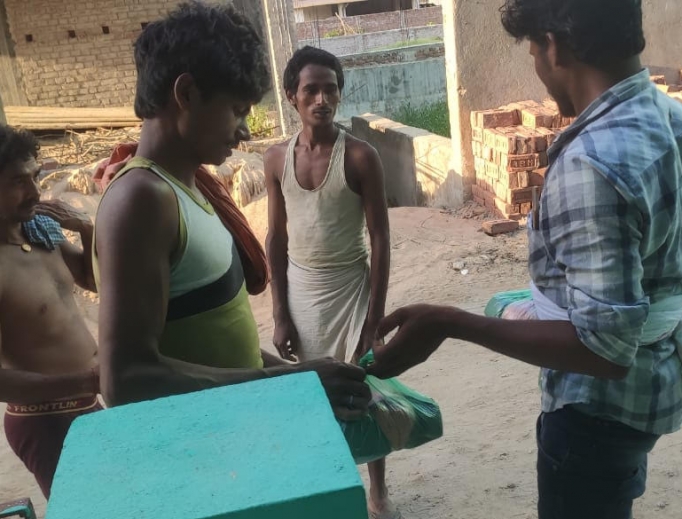India Faces New Challenges in Official Response to COVID-19 Pandemic
Hasty lockdown to ward off coronavirus spread was ‘like death sentence’ for the poor, says Indian bishop.

NEW DELHI — Catholic Church leaders and aid workers have joined the chorus of protests over the unprecedented humanitarian crisis in India, triggered by the sudden lockdown of the country in late March by the federal government to avert the COVID-19 pandemic.
“It was like a death sentence for the millions of poor. Had the government given more time for the people to move, much of their suffering could have been avoided,” Bishop Alex Vadakkumthala, chairman of the Labor Commission of the Catholic Bishops Conference of India (CBCI), told the Register on June 16.
“To save India, to save every Indian, there will be a complete ban on people from stepping outside their houses from midnight today,” declared Prime Minister Narendra Modi on March 24 while announcing the total lockdown of the country.
With factories and businesses shut abruptly, bustling cities came to a standstill. Millions of migrant laborers lost their jobs. Penniless and hungry, hundreds of thousands of them scrambled on foot to get to their native villages hundreds of miles away from big cities such as New Delhi, Bangalore, Chennai, Hyderabad and Mumbai.
“The lockdown was hasty and enforced without anticipating the havoc it would have had on the lives of the poor,” reiterated Bishop Vadakkumthala in an interview from his diocesan office at Kannur in southern Kerala state.
“Hunger will kill us before corona kills us! Better to die at home than here!” This was the refrain as thousands of migrants, including pregnant women, took to the highways, carrying their possessions in bags and either carrying their children on their shoulders or prodding them to walk alongside while clutching their hands.

As criticism turned louder over disturbing videos and images of migrant workers dying from hunger on the roads and in accidents while seeking rides in trucks, federal government eased the lock down and allowed special trains to transport stranded migrants.
Travel and Travail
The travail Shiv Kumar Mahato, a migrant tailor, had to undergo in Mumbai for nearly two months illustrates the chaos the lockdown caused in the lives of migrant laborers across India.
“After the lockdown was announced, the tailoring unit (of a textile vendor) was shut. Within a couple of weeks, the little money I had was gone and I was desperate to return home,” said Mahato, a high school dropout who has been eking out a living in Mumbai for a decade.
Mahato said that repeated visits to police and other offices to register himself for a seat in the special train for migrants proved futile. The train’s route would have returned Mahato to his native district of West Champaran, bordering Nepal on India’s eastern border.
“Luckily, in early May I met a journalist who had pity on me and convinced officials to get me a train seat to return home on May 24,” recounted Mahato.
The 1,200-mile train journey to Danapur, crisscrossing the country, should have taken only two days. Instead it took three days. But Mahato didn’t complain, as some migrant trains were delayed by several days to reach their destinations.
“Finally, I was at home with my wife and parents. I do not know what to do next,” said Mahato, explaining that he remains without any prospects of employment.
“The indifferent response of the government to the suffering of the poor was shocking,” Montfort Brother Varghese Theckanath told the Register. Brother Theckanath coordinates several social action programs from the Montfort Social Institute in Hyderabad.
“The sight of thousands of desperate people walking on the highways was unimaginable,” said Brother Theckanath, whose social worker teams fanned out and reached food supplies to neglected domestic workers who were confined to their slum dwellings as government had banned them from going to work.

Work for Justice
The Montfort Social Institute has been in the forefront of a national campaign seeking government recognition and extension of labor rights to the domestic workers across the country.
“The [federal] government started arranging transport for the stranded migrants too late. Even the judicial system failed the poor at the critical time,” remarked Claretian Father George Kannanthanam, who is based in Bangalore.
The Supreme Court of India declared on May 15 that it could not “stop or monitor [workers’] movement on roads” while rejecting social activists’ pleas for the government to ease the misery of the migrant laborers.
Following the widespread criticism over the indifference to India’s worst humanitarian crisis since its independence in 1947, on May 29 the Supreme Court ordered the Indian government to provide food, shelter and travel arrangements for the migrants. Even the United Nations stepped in, urging India to follow the Supreme Court orders to protect 100 million migrant workers.
“The government machinery was blind to the suffering of the people,” said Father Kannanthanam, who runs “Project Vision” for the blind, an eye-donation campaign, and mobilized several Catholic groups to reach relief to 16,000 families “on the periphery.”
In particular, this Catholic network was contacted by concerned forest officials who sought to deliver dry ration packs to a thousand nomadic “honey hunters” at Nagarhole National Park, 200 miles from Bangalore.
Meanwhile, Church centers in cities and highways opened their gates to shelter and offer food to those on the move or those on the verge of starvation due to loss of jobs in the lockdown.

Father Eugene Perera, CBCI Labor Commission secretary, told the Register that regional commissions and the Workers India Federation have been carrying out relief activities in collaboration with diocesan social services, parishes, and religious congregations.
“We are passing through challenging times. The suffering of the people is beyond words,” said Jesuit Father Tony Nishaant, principal of St. Xavier’s College of Management and Technology in Patna, capital of the eastern state of Bihar, which borders Nepal.
“Our college teams fanned out and distributed food supplies to needy people in vulnerable areas. As large numbers of people started gathering, the police imposed restrictions. Finally, we had to switch to coupons with which the workers could buy food items from specific shops,” Father Joseph explained.
The Jesuit social action seeking to address this situation, Father Joseph said, was focused mostly among those living in the slums, including the ostracized Musahar community (known as “rat-eaters”), one of India’s most marginalized and impoverished groups.
Wrong Approach?
Rajiv Bajaj, managing director of India’s second largest motorcycle manufacturer, Bajaj Auto, summed up, in a June 4 interview with the Hindustan Times, the economic misery resulting from the harsh lockdown. In the interview, Bajaj focused his criticism on the Indian government led by Prime Minister Modi.
“You [the government} flattened the wrong curve,” the top Indian industrialist said. “It is not the infection curve, it is the GDP [Gross Domestic Product] curve. This is what we have ended up with, the worst of both worlds.”
The Indian economy has nosedived due to the lockdown, while the coronavirus has continued to spread.

While India’s COVID-19 tally was relatively minuscule — 470 reported cases — when the lockdown was imposed on March 24, the count rose to 350,000 (fourth highest in the world, behind the U.S., Brazil, and Russia) with nearly 12,000 deaths reported by June 17.
“After the people were locked down for a long time and the government was under pressure to allow them to move, the migrants have carried the infection they picked up during the lockdown to remote areas,” said Bishop Vadakkumthala.
The rapid spread of coronavirus — linked to the mass movement of people — has stretched India’s health care facilities even in its big cities.
“COVID-19 patients are treated worse than animals. In one case, a body was found in the garbage. Patients are dying and nobody is there to even attend to them,” stated the Supreme Court of India on June 12, commenting on the shabby treatment of COVID-19 victims in New Delhi.
Catholic Support
In the meantime, Bishop Vadakkumthala, who served as secretary of CBCI’s health care commission for nearly a decade before he was elevated to bishop, has committed the Catholic Church in India to alleviating the suffering caused by the virus — and by the official response to the virus.
Apart from the 5,500 Catholic hospitals and health care centers in India, he said, hundreds of large Catholic college, school and other Church buildings are being used by the government as quarantine centers across the county.
“Several [state] governments are seeking support of the Church in the fight against COVID-19,” Bishop Vadakkumthala told the Register. “We will extend all our institutional support in the fight against this pandemic.”
Register correspondent Anto Akkara is based in Bangalore, India.
- Keywords:
- coronavirus
- indian catholic church
- lockdown
- the poor

















